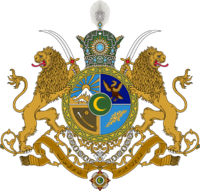Treaty between Benacian Union and Çakaristan
The Treaty of friendship and cooperation between the Benacian Union and the Çakar Empire was signed in Chryse on 14.II.1717 AN by Daniyal ibn Daniyal Simrani-Kalirion, Szodan of Benacia, for the Benacian Union, and Dervish Çelebi, Grand Vizier, for Çakaristan.
Text
TREATY OF FRIENDSHIP AND COOPERATIONBETWEEN
THE BENACIAN UNION
AND
THE ÇAKAR EMPIRE
His Excellency, Daniyal ibn Daniyal Simrani-Kalirion, Szodan of Benaciaand
His Majesty, Jaaguzan, Shahanshah of Çakaristan
desire for a diplomatic relationship and good understanding between them, underpinning further friendship between their respective countries, have agreed to the following articles of agreement:Article I – Peace and friendship
There shall be a firm and perpetual state of peace and friendly relations between His Excellency, the Szodan of Benacia and His Majesty, the Shahanshah of Çakaristan, between Their Heirs or Successors, and between the Benacian Union and the Çakar Empire, in this treaty the High Contracting Parties, and between their Citizens, without discrimination.Article II - Sovereignty and territorial integrity
Each High Contracting Party shall respect the independence, sovereignty and territorial integrity of the other party. The High Contracting Parties shall continue to develop and consolidate the relations of sincere friendship, good neighbourliness and comprehensive cooperation existing between them on the basis of the aforesaid principles as well as those of equality and mutual benefit.Article III - Airspace
Each High Contracting Party commits that any overflight of its airspace by aircraft registered upon the territory of the Other High Contracting Party, whose source and destination are outside the jurisdiction of the Overflown High Contracting Party and which make no intermediate landing upon the territory of the Overflown High Contracting Party, shall be considered to fall outside the remit of customs or immigration regulations and wholly outside the jurisdiction of any Third Parties, without prejudice to the exclusive right of the Overflown High Contracting Party to approve or deny such overflight as it sees fit.The High Contracting Parties can establish, by declaration, zones of prohibited airspace, where overflight is strictly prohibited. The High Contracting Party making such a declaration must inform the other High Contracting Party about the extent of the prohibited airspace and the appropriate punitive measures that will follow any unauthorised overflight of an aircraft registered to them.[1]
Article IV – Diplomatic mission
The High Contracting Parties will maintain regular contacts with each other on major international problems affecting the interests of both of their countries and governments by means of meetings, and exchanges of views between their leading statesmen, visits by official delegations and special envoys of the governments, and through diplomatic channels.The High Contracting Party will make an embassy available for each other. For the embassy, associated grounds, associated vehicles, leading statesmen, visits by official delegations, special envoys of the governments and ambassadors, diplomatic immunity applies.
Each High Contracting party recognizes and respects the procedures of acceptance by the ambassador, by handing over a letter of credence, which is addressed from one head of state to the other asking to give credence.
Article V - Recognition of bureaucracy
Each High Contracting Party gives to the other full faith and credit to all public acts, records, contracts and judicial proceedings in the field of civil law, including records and documents on marriage, property, titles, death and inheritance, in as much as any act, record, document, contract, proceeding is done according to the law.Article VI - Interpretation
Any difference of interpretation of any Article or Articles of this Treaty which may arise between the High Contracting Parties will be settled bilaterally by peaceful means in a spirit of mutual respect and understanding.Article VII - Ratification
This Treaty enters into force upon its signature and ratification by Both High Contracting Parties in accordance with their respective domestic procedures.
Signed on 14.II.1717 AN at Chryse:For the Benacian Union:
Daniyal ibn Daniyal Simrani-Kalirion
Szodan of Benacia
For the Çakar Empire:
Dervish Çelebi
Grand Vizier of Çakaristan

